九年级英语全册期末Unit 10 You're supposed to shake hands.单元复习课件(共有PPT31张)
文档属性
| 名称 | 九年级英语全册期末Unit 10 You're supposed to shake hands.单元复习课件(共有PPT31张) | 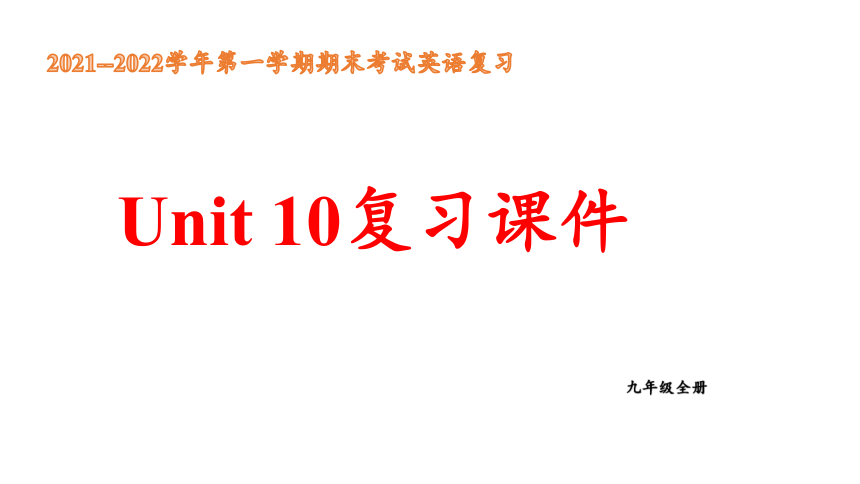 | |
| 格式 | zip | ||
| 文件大小 | 408.3KB | ||
| 资源类型 | 教案 | ||
| 版本资源 | 人教新目标(Go for it)版 | ||
| 科目 | 英语 | ||
| 更新时间 | 2022-01-02 20:38:34 | ||
图片预览

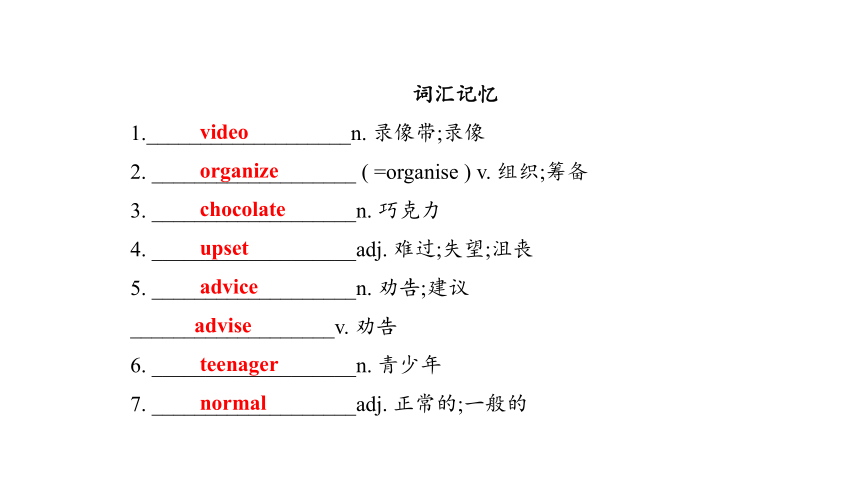
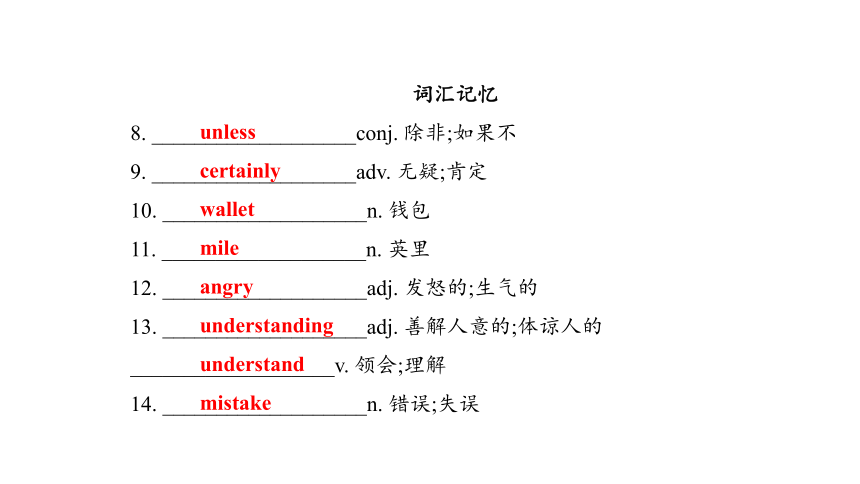
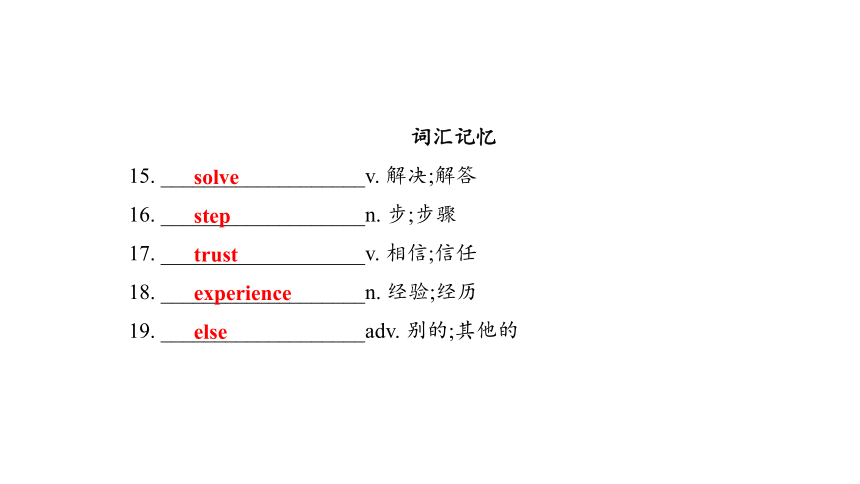
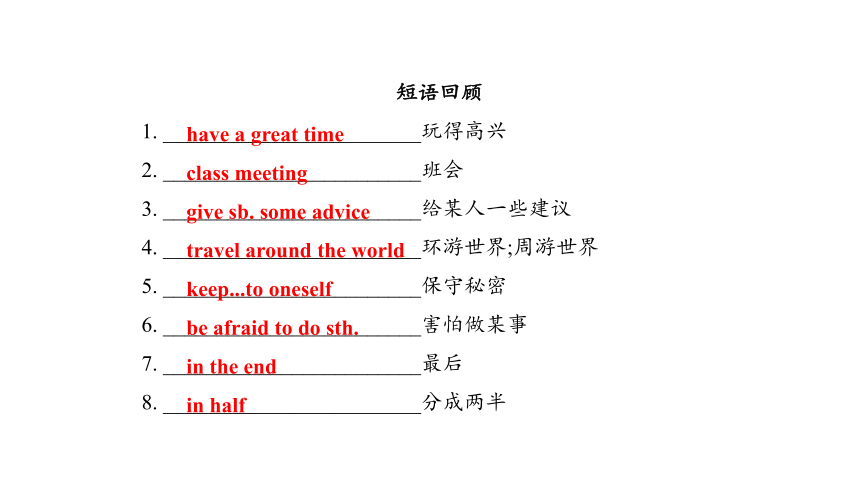
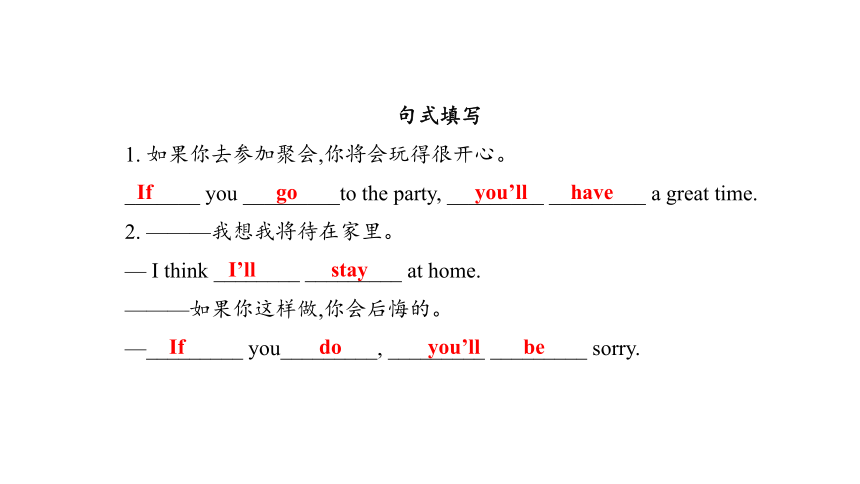
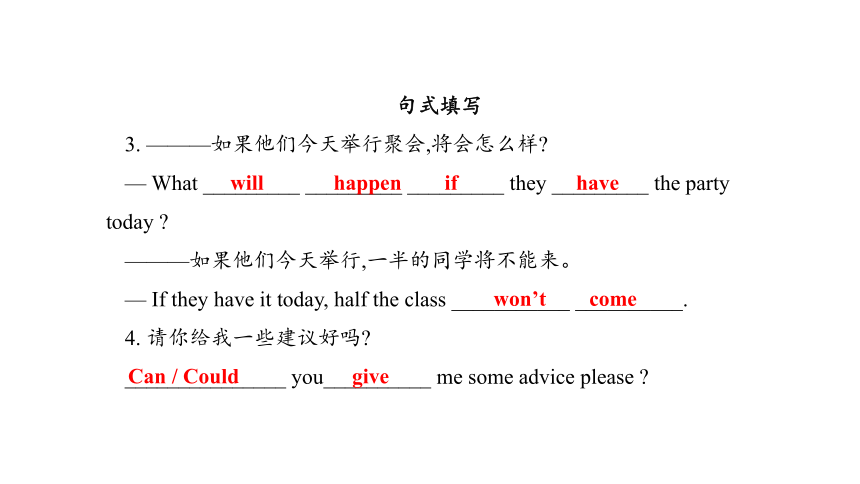
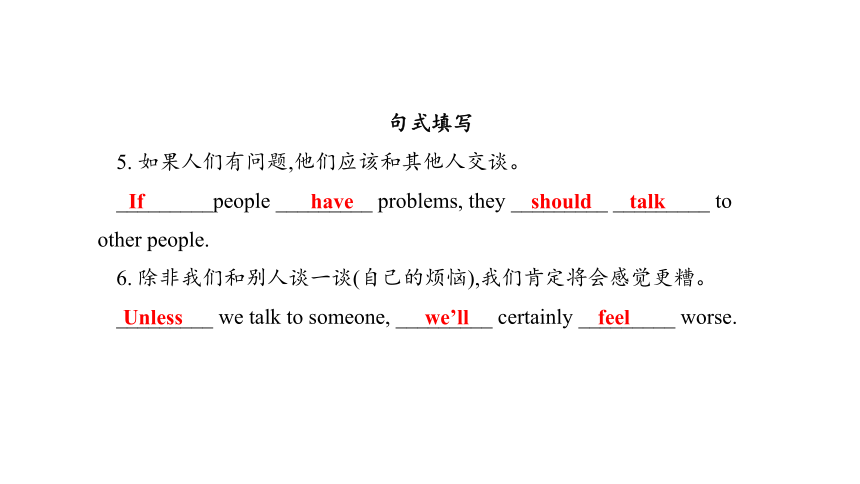
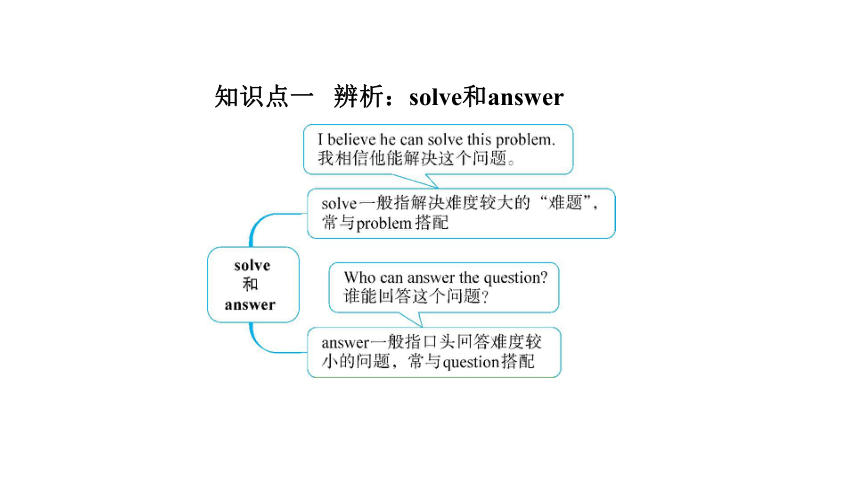
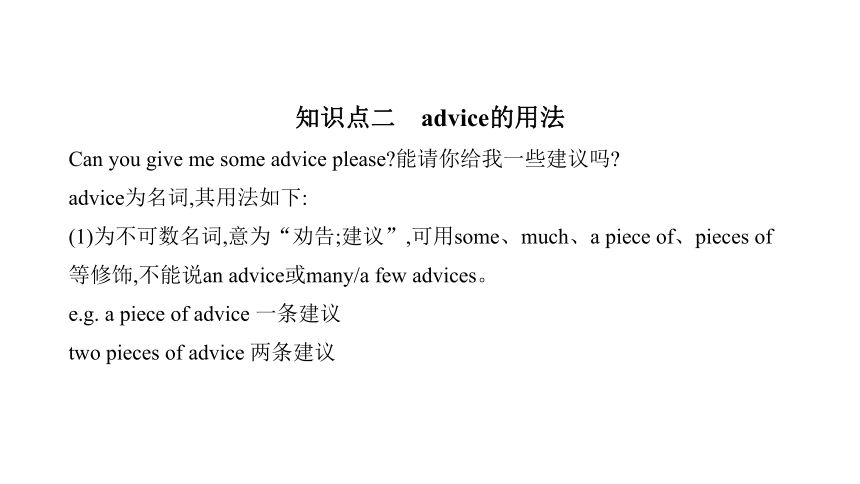
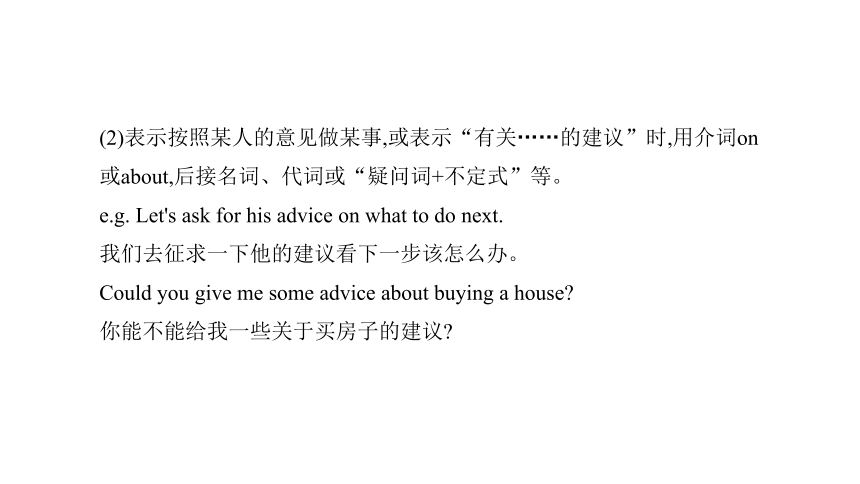
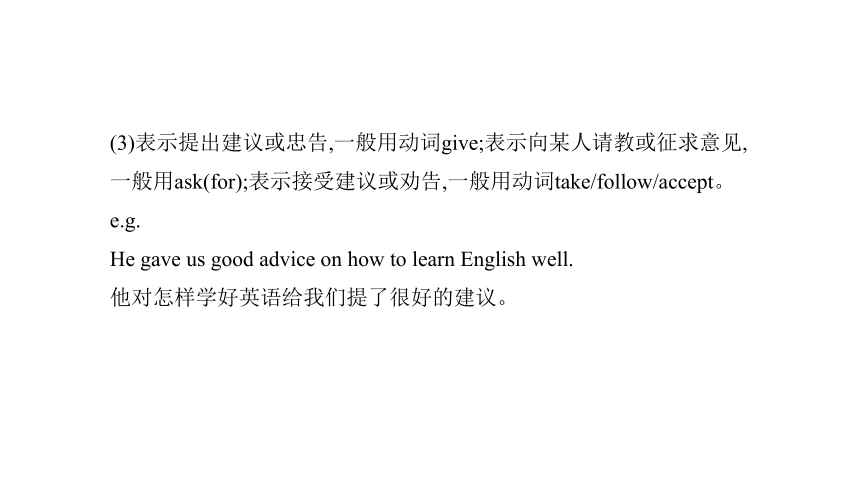
文档简介
(共31张PPT)
Unit 10复习课件
2021--2022学年第一学期期末考试英语复习
九年级全册
词汇记忆
1.___________________n. 录像带;录像
2. ___________________ ( =organise ) v. 组织;筹备
3. ___________________n. 巧克力
4. ___________________adj. 难过;失望;沮丧
5. ___________________n. 劝告;建议
___________________v. 劝告
6. ___________________n. 青少年
7. ___________________adj. 正常的;一般的
video
organize
chocolate
upset
advice
advise
teenager
normal
词汇记忆
8. ___________________conj. 除非;如果不
9. ___________________adv. 无疑;肯定
10. ___________________n. 钱包
11. ___________________n. 英里
12. ___________________adj. 发怒的;生气的
13. ___________________adj. 善解人意的;体谅人的
___________________v. 领会;理解
14. ___________________n. 错误;失误
unless
certainly
wallet
mile
angry
understanding
understand
mistake
词汇记忆
15. ___________________v. 解决;解答
16. ___________________n. 步;步骤
17. ___________________v. 相信;信任
18. ___________________n. 经验;经历
19. ___________________adv. 别的;其他的
solve
step
trust
experience
else
短语回顾
1. ________________________玩得高兴
2. ________________________班会
3. ________________________给某人一些建议
4. ________________________环游世界;周游世界
5. ________________________保守秘密
6. ________________________害怕做某事
7. ________________________最后
8. ________________________分成两半
have a great time
class meeting
give sb. some advice
travel around the world
keep...to oneself
be afraid to do sth.
in the end
in half
句式填写
1. 如果你去参加聚会,你将会玩得很开心。
_______ you _________to the party, _________ _________ a great time.
2. ———我想我将待在家里。
— I think ________ _________ at home.
———如果你这样做,你会后悔的。
—_________ you_________, _________ _________ sorry.
If go you’ll have
I’ll stay
If do you’ll be
句式填写
3. ———如果他们今天举行聚会,将会怎么样
— What _________ _________ _________ they _________ the party today
———如果他们今天举行,一半的同学将不能来。
— If they have it today, half the class ___________ __________.
4. 请你给我一些建议好吗
_______________ you__________ me some advice please
will happen if have
won’t come
Can / Could give
句式填写
5. 如果人们有问题,他们应该和其他人交谈。
_________people _________ problems, they _________ _________ to other people.
6. 除非我们和别人谈一谈(自己的烦恼),我们肯定将会感觉更糟。
_________ we talk to someone, _________ certainly _________ worse.
If have should talk
Unless we’ll feel
知识点一 辨析:solve和answer
知识点二 advice的用法
Can you give me some advice please 能请你给我一些建议吗
advice为名词,其用法如下:
(1)为不可数名词,意为“劝告;建议”,可用some、much、a piece of、pieces of等修饰,不能说an advice或many/a few advices。
e.g. a piece of advice 一条建议
two pieces of advice 两条建议
(2)表示按照某人的意见做某事,或表示“有关……的建议”时,用介词on或about,后接名词、代词或“疑问词+不定式”等。
e.g. Let's ask for his advice on what to do next.
我们去征求一下他的建议看下一步该怎么办。
Could you give me some advice about buying a house
你能不能给我一些关于买房子的建议
(3)表示提出建议或忠告,一般用动词give;表示向某人请教或征求意见,一般用ask(for);表示接受建议或劝告,一般用动词take/follow/accept。
e.g.
He gave us good advice on how to learn English well.
他对怎样学好英语给我们提了很好的建议。
My teacher gave me much on how to study English
well when I had some trouble.
A.suggestion B.question
C.advice D.problem
C
知识点三 advise的用法
Robert Hunt advises students about common problems.
罗伯特·亨特就常见的问题向学生提出建议。
advise在此处为及物动词,意为“建议”。常见用法如下:
Evans had a sore throat. His friend advised him some hot water.
A.drinking B.to drink
C.drink D.drank
B
知识点四 “疑问词+动词不定式”的用法
I don't know what to do about going to Mike's birthday party tomorrow night.
关于明天晚上去参加迈克的生日宴会我不知道该做什么。
what to do“做什么”,为“疑问词+动词不定式”结构。疑问词what、which、
when、where、how等常用于know、tell、wonder、ask、find out、learn等动词或动词短语之后作宾语,构成“疑问词+动词不定式”结构。
—Excuse me. Do you know
—Sorry, I don't know, either.
A.how to check out a book
B.when will the concert begin
C.that there is a bank near here
D.how long the meeting would last
A
知识点五 unless的用法
Unless we talk to someone, we'll certainly feel worse.
除非我们和某人交谈,否则我们肯定会感觉更糟。
unless意为“如果不;除非”,引导条件状语从句,相当于if条件状语从句的否定形式,即unless=if...not。unless使用注意事项:
(1)unless引导的条件状语从句和if引导的条件状语从句,以及时间状语从句一样,用一般现在时代替一般将来时,主句用一般将来时,即所谓的“主将从现”。
(2)unless引导条件状语从句,一般不用于虚拟条件句。if可以引导条件状语从句或用于非真实(或虚拟)条件句。
e.g. If she weren't so silly,she would understand.
如果她不那么傻,她就会明白了。
Our business won't improve we offer better services to
our customers.
A.because B.unless
C.after D.since
B
知识点六 keep的用法
She just kept thinking, “If I tell my parents, they'll be angry!”
她一直在想,“如果我告诉我的父母,他们会生气的!”
keep doing意思是“一直在做,持续在做”。keep的用法如下:
(1)用作系动词,意为“保持(某种状态)”,其后常接形容词作表语。
e.g. Please keep quiet/silent!请保持安静!
(2)用作实义动词,可表示:
①保管;保存;保留。
e.g. Please keep these things for me while I am away.
在我离开期间,请替我保管这些东西。
②饲养。
e.g. I used to keep sheep in my childhood.
我在孩提时常常养羊。
③经营。
e.g. Her father kept a bookshop for several years.
她父亲开了几年书店。
④坚持;继续。后面如接动词,要用动词-ing 形式作宾语。
e.g. If you keep (on) practising your spoken English, you'll soon make great progress.
如果你坚持练习英语口语,你很快就会取得很大的进步。
⑤阻止;阻碍。常用于 keep sb./sth. from doing sth.
e.g. The heavy rain didn't keep them from watching the football match.
大雨没能阻止他们观看足球赛。
⑥保持。其后常接复合宾语,表示使(某人或某物)保持某种状态或使某一动作继续。常见句型如下:
1. Drugs are harmful to people's physical and mental health. We teenagers must ________ them.
A. take care of
B. keep away from
C. get used to
B
if引导的条件状语从句
if意为“如果”,表示正面条件。由if引导的条件状语从句表示在某种条件下某事很可能发生。if从句可以放在句首,也可以放在句末。位于句首时,要用逗号隔开。
e.g. Difficulties are nothing if we are not afraid of them.
如果我们不怕困难,困难就算不了什么。
当if引导的从句为否定句时,可以用unless转化。
e.g. If you don't work hard,you will fail.
=Unless you work hard,you will fail.
你若不努力工作,就会失败。
在含有if/unless引导的条件状语从句的主从复合句中,若主句时态是一般将来时,或主句是祈使句或含有情态动词,从句应用一般现在时代替一般将来时,即“主将从现”。
e.g. He'll come unless he forgets about it.
除非他忘了,不然他会来的。
If he is free,he must come to help us.
如果他有空,他一定会来帮我们的。
【2020 黑龙江哈尔滨市 】—Tim, our foreign teacher Ms. Green will go back to England next week.
—Really Let's have a party to say goodbye to her ________ she is free this weekend.
A. unless B. if C. though
B
情态动词should的用法
should作为情态动词,与其他情态动词一样,常用来表示说话人对某一动作或状态的态度、情感。它虽然有实际的意义,但不可单独作谓语,需与动词原形连用。它没有人称和数的变化,其否定形式为should not,可缩写为shouldn't。其主要用法如下:
(1)表示“应该,应当”。
e.g. You should help your mother with the housework.
你应该帮你妈妈做家务。
Should I wear a coat 我应该穿件大衣吗
(2)表示“可能(=probably)”。
e.g. He should arrive soon.
他可能很快就到了。
The train should have already left.
火车应该已经走了。
She should come here at any moment.
她随时都可能来这儿。
My watch should be in your bag.
我的手表可能在你的包里。
(3)表示“竟然”。
e.g. It's strange that he should be late.
真奇怪,他竟然会迟到。
It's strange that it should be so cold today.
很奇怪,今天竟然这么冷。
(4)用在第一人称疑问句中,表示征求对方意见。
e.g. Should I help you with the dinner 要不要我帮你做晚饭
What do you think I should do 你认为我该做什么
Unit 10复习课件
2021--2022学年第一学期期末考试英语复习
九年级全册
词汇记忆
1.___________________n. 录像带;录像
2. ___________________ ( =organise ) v. 组织;筹备
3. ___________________n. 巧克力
4. ___________________adj. 难过;失望;沮丧
5. ___________________n. 劝告;建议
___________________v. 劝告
6. ___________________n. 青少年
7. ___________________adj. 正常的;一般的
video
organize
chocolate
upset
advice
advise
teenager
normal
词汇记忆
8. ___________________conj. 除非;如果不
9. ___________________adv. 无疑;肯定
10. ___________________n. 钱包
11. ___________________n. 英里
12. ___________________adj. 发怒的;生气的
13. ___________________adj. 善解人意的;体谅人的
___________________v. 领会;理解
14. ___________________n. 错误;失误
unless
certainly
wallet
mile
angry
understanding
understand
mistake
词汇记忆
15. ___________________v. 解决;解答
16. ___________________n. 步;步骤
17. ___________________v. 相信;信任
18. ___________________n. 经验;经历
19. ___________________adv. 别的;其他的
solve
step
trust
experience
else
短语回顾
1. ________________________玩得高兴
2. ________________________班会
3. ________________________给某人一些建议
4. ________________________环游世界;周游世界
5. ________________________保守秘密
6. ________________________害怕做某事
7. ________________________最后
8. ________________________分成两半
have a great time
class meeting
give sb. some advice
travel around the world
keep...to oneself
be afraid to do sth.
in the end
in half
句式填写
1. 如果你去参加聚会,你将会玩得很开心。
_______ you _________to the party, _________ _________ a great time.
2. ———我想我将待在家里。
— I think ________ _________ at home.
———如果你这样做,你会后悔的。
—_________ you_________, _________ _________ sorry.
If go you’ll have
I’ll stay
If do you’ll be
句式填写
3. ———如果他们今天举行聚会,将会怎么样
— What _________ _________ _________ they _________ the party today
———如果他们今天举行,一半的同学将不能来。
— If they have it today, half the class ___________ __________.
4. 请你给我一些建议好吗
_______________ you__________ me some advice please
will happen if have
won’t come
Can / Could give
句式填写
5. 如果人们有问题,他们应该和其他人交谈。
_________people _________ problems, they _________ _________ to other people.
6. 除非我们和别人谈一谈(自己的烦恼),我们肯定将会感觉更糟。
_________ we talk to someone, _________ certainly _________ worse.
If have should talk
Unless we’ll feel
知识点一 辨析:solve和answer
知识点二 advice的用法
Can you give me some advice please 能请你给我一些建议吗
advice为名词,其用法如下:
(1)为不可数名词,意为“劝告;建议”,可用some、much、a piece of、pieces of等修饰,不能说an advice或many/a few advices。
e.g. a piece of advice 一条建议
two pieces of advice 两条建议
(2)表示按照某人的意见做某事,或表示“有关……的建议”时,用介词on或about,后接名词、代词或“疑问词+不定式”等。
e.g. Let's ask for his advice on what to do next.
我们去征求一下他的建议看下一步该怎么办。
Could you give me some advice about buying a house
你能不能给我一些关于买房子的建议
(3)表示提出建议或忠告,一般用动词give;表示向某人请教或征求意见,一般用ask(for);表示接受建议或劝告,一般用动词take/follow/accept。
e.g.
He gave us good advice on how to learn English well.
他对怎样学好英语给我们提了很好的建议。
My teacher gave me much on how to study English
well when I had some trouble.
A.suggestion B.question
C.advice D.problem
C
知识点三 advise的用法
Robert Hunt advises students about common problems.
罗伯特·亨特就常见的问题向学生提出建议。
advise在此处为及物动词,意为“建议”。常见用法如下:
Evans had a sore throat. His friend advised him some hot water.
A.drinking B.to drink
C.drink D.drank
B
知识点四 “疑问词+动词不定式”的用法
I don't know what to do about going to Mike's birthday party tomorrow night.
关于明天晚上去参加迈克的生日宴会我不知道该做什么。
what to do“做什么”,为“疑问词+动词不定式”结构。疑问词what、which、
when、where、how等常用于know、tell、wonder、ask、find out、learn等动词或动词短语之后作宾语,构成“疑问词+动词不定式”结构。
—Excuse me. Do you know
—Sorry, I don't know, either.
A.how to check out a book
B.when will the concert begin
C.that there is a bank near here
D.how long the meeting would last
A
知识点五 unless的用法
Unless we talk to someone, we'll certainly feel worse.
除非我们和某人交谈,否则我们肯定会感觉更糟。
unless意为“如果不;除非”,引导条件状语从句,相当于if条件状语从句的否定形式,即unless=if...not。unless使用注意事项:
(1)unless引导的条件状语从句和if引导的条件状语从句,以及时间状语从句一样,用一般现在时代替一般将来时,主句用一般将来时,即所谓的“主将从现”。
(2)unless引导条件状语从句,一般不用于虚拟条件句。if可以引导条件状语从句或用于非真实(或虚拟)条件句。
e.g. If she weren't so silly,she would understand.
如果她不那么傻,她就会明白了。
Our business won't improve we offer better services to
our customers.
A.because B.unless
C.after D.since
B
知识点六 keep的用法
She just kept thinking, “If I tell my parents, they'll be angry!”
她一直在想,“如果我告诉我的父母,他们会生气的!”
keep doing意思是“一直在做,持续在做”。keep的用法如下:
(1)用作系动词,意为“保持(某种状态)”,其后常接形容词作表语。
e.g. Please keep quiet/silent!请保持安静!
(2)用作实义动词,可表示:
①保管;保存;保留。
e.g. Please keep these things for me while I am away.
在我离开期间,请替我保管这些东西。
②饲养。
e.g. I used to keep sheep in my childhood.
我在孩提时常常养羊。
③经营。
e.g. Her father kept a bookshop for several years.
她父亲开了几年书店。
④坚持;继续。后面如接动词,要用动词-ing 形式作宾语。
e.g. If you keep (on) practising your spoken English, you'll soon make great progress.
如果你坚持练习英语口语,你很快就会取得很大的进步。
⑤阻止;阻碍。常用于 keep sb./sth. from doing sth.
e.g. The heavy rain didn't keep them from watching the football match.
大雨没能阻止他们观看足球赛。
⑥保持。其后常接复合宾语,表示使(某人或某物)保持某种状态或使某一动作继续。常见句型如下:
1. Drugs are harmful to people's physical and mental health. We teenagers must ________ them.
A. take care of
B. keep away from
C. get used to
B
if引导的条件状语从句
if意为“如果”,表示正面条件。由if引导的条件状语从句表示在某种条件下某事很可能发生。if从句可以放在句首,也可以放在句末。位于句首时,要用逗号隔开。
e.g. Difficulties are nothing if we are not afraid of them.
如果我们不怕困难,困难就算不了什么。
当if引导的从句为否定句时,可以用unless转化。
e.g. If you don't work hard,you will fail.
=Unless you work hard,you will fail.
你若不努力工作,就会失败。
在含有if/unless引导的条件状语从句的主从复合句中,若主句时态是一般将来时,或主句是祈使句或含有情态动词,从句应用一般现在时代替一般将来时,即“主将从现”。
e.g. He'll come unless he forgets about it.
除非他忘了,不然他会来的。
If he is free,he must come to help us.
如果他有空,他一定会来帮我们的。
【2020 黑龙江哈尔滨市 】—Tim, our foreign teacher Ms. Green will go back to England next week.
—Really Let's have a party to say goodbye to her ________ she is free this weekend.
A. unless B. if C. though
B
情态动词should的用法
should作为情态动词,与其他情态动词一样,常用来表示说话人对某一动作或状态的态度、情感。它虽然有实际的意义,但不可单独作谓语,需与动词原形连用。它没有人称和数的变化,其否定形式为should not,可缩写为shouldn't。其主要用法如下:
(1)表示“应该,应当”。
e.g. You should help your mother with the housework.
你应该帮你妈妈做家务。
Should I wear a coat 我应该穿件大衣吗
(2)表示“可能(=probably)”。
e.g. He should arrive soon.
他可能很快就到了。
The train should have already left.
火车应该已经走了。
She should come here at any moment.
她随时都可能来这儿。
My watch should be in your bag.
我的手表可能在你的包里。
(3)表示“竟然”。
e.g. It's strange that he should be late.
真奇怪,他竟然会迟到。
It's strange that it should be so cold today.
很奇怪,今天竟然这么冷。
(4)用在第一人称疑问句中,表示征求对方意见。
e.g. Should I help you with the dinner 要不要我帮你做晚饭
What do you think I should do 你认为我该做什么
同课章节目录
- Unit 1 How can we become good learners.
- Section A
- Section B
- Unit 2 I think that mooncakes are delicious!
- Section A
- Section B
- Unit 3 Could you please tell me where the restroom
- Section A
- Section B
- Unit 4 I used to be afraid of the dark.
- Section A
- Section B
- Unit 5 What are the shirts made of?
- Section A
- Section B
- Review of Units 1-5
- Unit 6 When was it invented?
- Section A
- Section B
- Unit 7 Teenagers should be allowed to choose their
- Section A
- Section B
- Unit 8 It must belong to Carla.
- Section A
- Section B
- Unit 9 I like music that I can dance to.
- Section A
- Section B
- Unit 10 You're supposed to shake hands.
- Section A
- Section B
- Review of Units 6-10
- Unit 11 Sad movies make me cry.
- Section A
- Section B
- Unit 12 Life is full of the unexpected
- Section A
- Section B
- Unit 13 We're trying to save the earth!
- Section A
- Section B
- Unit 14 I remember meeting all of you in Grade 7.
- Section A
- Section B
- Review of Units 11-14
